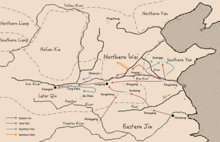Liu Yu's Northern Expeditions (simplified Chinese: 刘裕北伐; traditional Chinese: 劉裕北伐; pinyin: Liú Yù Běi Fá) were a series of successful campaigns mounted by the Eastern Jin dynasty from 409 AD to 416 AD against the Southern Yan, Later Qin, Northern Wei and Hu Xia dynasties that successfully recovered all of Eastern Jin's territory south of the Yellow River with the exception of the Chang'an area, which was taken by Hu Xia. These victories were the basis of the prosperity of the Reign of Yuanjia.
| Liu Yu's Northern Expeditions | |||||||
|---|---|---|---|---|---|---|---|
| Part of Eastern Jin and Sixteen Kingdoms period | |||||||
 Map of Liu Yu's Northern Expeditions | |||||||
| |||||||
| Belligerents | |||||||
| Eastern Jin dynasty |
Later Qin dynasty Southern Yan dynasty Hu Xia dynasty Northern Wei dynasty | ||||||
| Commanders and leaders | |||||||
| Liu Yu | Various | ||||||
| Strength | |||||||
| c. 100,000–200,000 | Northern Wei: c. 100,000, others unknown but probably similar. | ||||||
| Casualties and losses | |||||||
| light | heavy | ||||||
Background edit
Following the Eastern Jin's victory at the Battle of Fei River, North China divided into several dynastic states ruled by non-Han peoples. After Liu Yu, one of the most excellent generals of the time, came to power in the Eastern Jin, Liu Yu saw the opportunity to recover the former territories held by the Western Jin dynasty. However, he also sought to use these expeditions to expand his prestige and be given the nine bestowments, a step he must take before he could usurp the Jin throne.
Expeditions edit
1st expedition against Southern Yan edit
Liu Yu's first expedition was against Southern Yan in 409 CE. The Eastern Jin army attacked from Jiankang to Xiapei, and then to Longchen. Along the roads, Eastern Jin's forces built fortresses to prevent Southern Yan forces from cutting off their supplies. They engaged Southern Yan forces at the Battle of Linqu, winning decisively. By May, Eastern Jin forces reached the Southern Yan capital at Guanggu. When he reached the area, Liu Yu saw that the ground was covered with grain and he said to his men that: "The Southern Yan ruler is already in my hand", as there would be no supply problems. In February 410 CE, Eastern Jin forces captured Guanggu and put an end to Southern Yan.
2nd expedition against Later Qin edit
In 416 CE, Liu Yu launched a major attack against Later Qin. Early in the campaign, he captured the important cities of Xuchang and Luoyang, the latter being the former capital of the Western Jin dynasty. After a symbolic victory in Luoyang, Liu Yu began preparing himself to claim the nine bestowments. He was offered the nine bestowments and the title of Duke of Song, but initially rejected them as a gesture of humility. He then sent two armies into Shaanxi to engage the remnants of Later Qin's forces.
On their way there, the Eastern Jin forces were harassed by Northern Wei cavalry, who attacked the Eastern Jin forces' supply routes. In a major engagement, Eastern Jin forces defeated Northern Wei forces using crossbows to launch spears through the Northern Wei forces, frightening them and reputedly killing some 30,000 Wei soldiers. Following this victory, Eastern Jin forces continued on Later Qin and captured its capital Chang'an, destroying it.
Loss of Chang'an region edit
Following this victory, it seemed that the Eastern Jin would quickly destroy Hu Xia, Northern Wei and the remaining non-Han states, reunifying China proper. However, Liu Yu returned to Jiankang due to the death of Liu Muzhi, Liu Yu's aide who he had entrusted to keep the imperial court in check while he was away. Liu Yu left his 10-year-old son, Liu Yizhen, to guard the Guanzhong region with supervision from the likes of Wang Xiu and Wang Zhen'e. Hu Xia forces took advantage of Liu Yu's absence to capture Guanzhong in 418. During the defence, the Jin generals were involved in violent infighting. As a result, Xia conquered Guanzhong while many of Liu Yu's key generals like Wang Zhen'e and Zhu Lingshi were killed. Nevertheless, the Eastern Jin still held most of the territories south of the Yellow River.
Aftermath edit
These victories laid the foundation for the Reign of Yuanjia, a period of relative prosperity brought about by diminished threats of invasion or constant warfare.
References edit
Sources edit
- Book of Song.